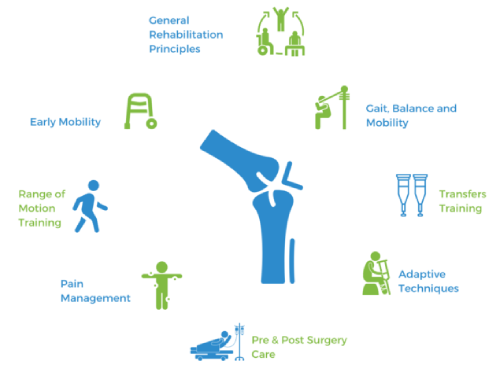Knee Pain Relief after Surgery: How Rehabilitation Helps
Knee replacement surgeries resurface a damaged knee. However, quite often a patient is not fully relieved of the pain even after the surgery. Arthroscopic surgeries, the minimally invasive alternative procedures, could also leave one in pain due to several reasons. Recognizing post operative symptoms early and initiating orthopedic rehabilitation care are essential in order to gain the full benefit of a knee replacement procedure.
Orthopedic rehabilitation is the specialized program designed for individuals suffering from musculoskeletal ailments to improve strength, endurance, flexibility and restore mobility & independence. Some common conditions which require orthopedic rehabilitation include hip or knee replacement surgeries, fractures, arthritis, sports injuries, degenerative joint diseases among others.

What causes Knee Pain after Surgery?
Post-operative pain is commonly reported among those who had a knee replacement procedure. However, some people may face more struggles during the recovery period due to certain co-morbidities. Few reasons why your knees may hurt after the surgery are
While applying ice and anti-inflammatory medications could help in reducing inflammations, nothing like a systematic rehabilitation programme can help in keeping a check on the co-morbidities thus providing complete pain relief and empowered recovery.
Pre- Rehabilitation for Knee Pain Relief
In order to have a minimally painful experience, doctors and therapists recommend undergoing a pre-rehabilitation programme before undergoing the surgery. Patients who followed an active lifestyle and performed pre-rehabilitation tactics including performing of exercises for up to 8 weeks until the surgery, recover faster. Therapeutic interventions and highly targeted exercises in the weeks leading up to surgery, strengthen the muscles around the joint, enhance blood circulation, reduce fatigue, swelling and risk of blood clots and improve the overall recovery. This is a way of preparing the knee joint for surgery.
Orthopedic Rehabilitation for Knee Pain Relief & Empowered Recovery
Orthopedic injuries, surgeries and illnesses could interfere with the function of the musculoskeletal system (comprising of muscles, bones, cartilage, joints etc) of the body thereby impairing movement and locomotion. For those who had very active lifestyles will find it extremely difficult to adjust with this condition and will require specialized care to easily get back to their normal lives. Orthopedic rehabilitation is thus recommended for early, effective and empowered care.
Key Components of Orthopedic Rehabilitation programmes
A detailed and consistent consultation with an expert panel of doctors is imperative in knee pain relief and also in the holistic recovery of an individual. Therefore, at HCAH SuVitas, we loop in the expertise and guidance of orthopaedic surgeons, physiotherapists, occupational therapists, skilled nurses, dieticians, prosthetists, orthotists and psychologists.
Rehabilitation after knee surgery can ensure pain relief, get you back to normal life at the earliest.
